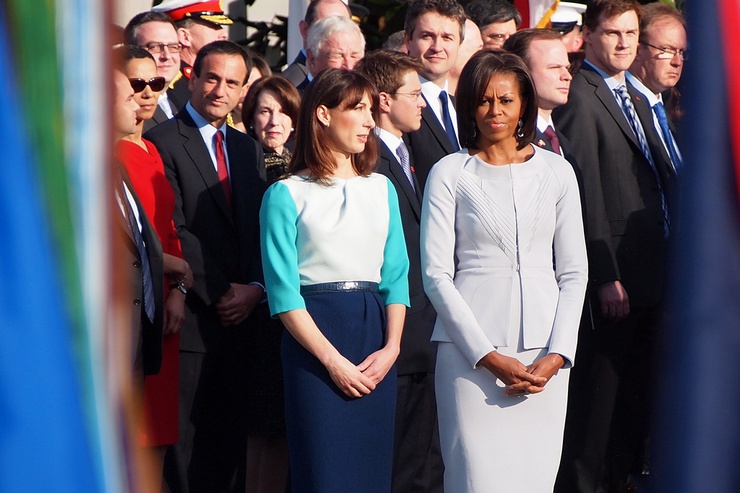
Tusk, Balboa, Cameron, Trierweiler: dreams of a Jackie Kennedy Europe
Published on
Translation by:
Matthew DykesThe role of the first lady, a typical American phenomenon, has no direct counterpart in Europe. That's not just because of the difference in political systems (do we go with the president’s wife - or the prime minister’s?), but also due to cultural differences. In the US, the ladies seem to seek centre stage; in Europe, they seek their independence
It's been well documented, but we'll go through it again for you. 'Tonight I am here as a wife, mother and grandmother, and as an American, to make you one solemn promise: this man (Mitt Romney) will not fail.' Dressed in red and musically accompanied by a version of My Girl by The Temptations, Ann Romney (the possible future first lady of the United States) made her first solo speech at the Republican convention held in Florida on 29 August.
Days later, Michelle Obama entered the Democratic national convention to the tune of Signed, Sealed, Delivered, I'm Yours by Stevie Wonder. She spoke with her famous broad shoulders uncovered, declaring that her husband 'believes that women are more than capable to make their own decisions about their health and their bodies'. She then went back the way that she came, unaccompanied. Although she did of course pay homage to her husband, she spoke as a woman. Unlike Ann, who spoke as a devoted wife.
Do these polarities exist amongst the first ladies of Europe? Far from the British outfits worn by Cherie Blair, the Italian affairs that Veronica Lario was oblivious to and Carla Bruni’s Franco-Italian imitation of Jacqueline Kennedy, a new generation of European spouses is coming to the forefront. Their independence makes them different. Such is the case of Elvira Fernández Balboa: low-key, the Spanish prime minister's wife is described as a catholic mother, who listens to spotify in her free time, and tries to protect her family by distancing herself from the political agenda of her husband, Mariano Rajoy.
Read cafebabel.com's 2006 interview with Cherie Blair
Having had their fill of bimbos, Italians seem more than satisfied with Mario Monti’s wife, Elsa Antonioli. Described as an old-fashioned, sober, reliable and reserved woman, Antonioli is commissioner of the red cross in Milan. Much has changed since the days when the Italian head of government was known for expressions like bunga bunga.
However, this courtesy does not extend to the other European First Ladies. Take Samantha Cameron, for example, wife of the British prime minister and daughter of the aristocrat Sir Reginald Sheffield. The dolphin tattoo on her ankle might not make her a rebel, but her supposed reply of “' fucking hope not' when she was told that she might be moving to 10 Downing Street shows that she has a certain character - or street credibility, according to this report from the UK.

Equally as outspoken is France's Valerie Trierweiler, the partner of François Hollande. Apart from the memorable tweet she posted about the ex of her current partner, we can’t neglect to mention her reply on twitter to the former French president: 'Sarkozy doesn’t know what independent journalism is'. Less seditious, but with similar enthusiasm, is Małgorzata Tusk, the wife of the Polish prime minister. With a parliament where women make up only 20% of members, and a senate where they make up barely 8%, Tusk is fighting for equality so that Polish women participate more in the politics of their country.
Read 'Political husbands’ and wives’ circus in Europe' on cafebabel.com
Though each case has its own particularities, a certain dichotomy seems to have been established between the first ladies – and not just in Europe. The sugar coated image of charity work is obsolete. Amongst the wives of the current heads of state there are those who continue to lead their previous lives in privacy, voluntarily detached from the public domain; and those who publicly show their support for their husbands. And all of them play this role without giving up their individuality, their independence, their free thinking, or their imperfections, when faced with so much objectification and scrutiny. In short, without giving up their right to bare their shoulders.
Images: main (cc) Tiffany.Ann.M; in-text (cc) Medill DC/ both via flickr/ video: Romney (cc) MamaBarracuda and Obama (cc) WSJDigitalNetwork/ youtube
Translated from Obama, Cameron, Trierweiler y Cía.: derecho a mostrar los hombros



